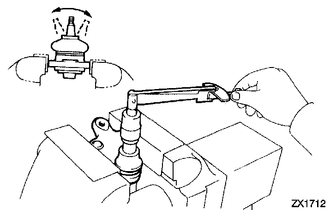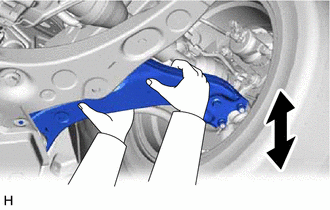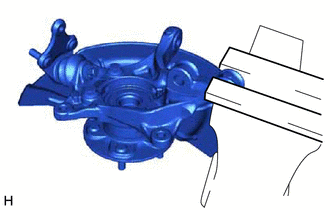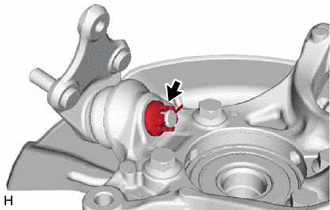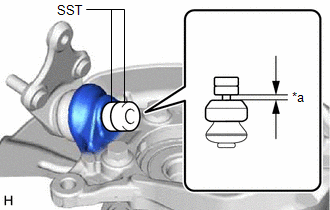Toyota Avalon (XX50): Front Lower Ball Joint
Components
COMPONENTS
ILLUSTRATION
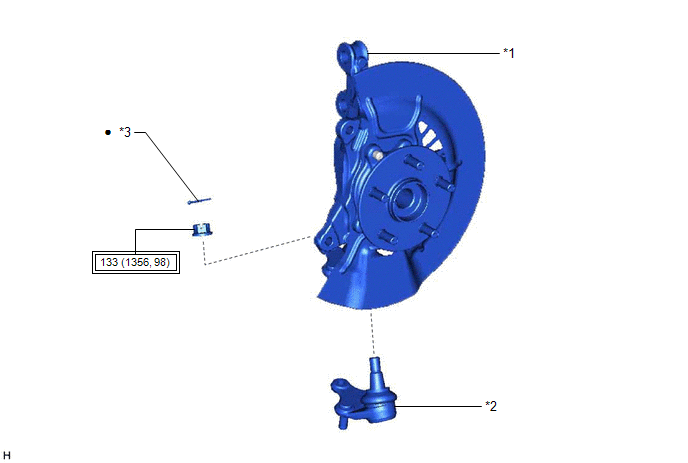
|
*1 | FRONT AXLE ASSEMBLY |
*2 | FRONT LOWER BALL JOINT ASSEMBLY |
|
*3 | COTTER PIN |
- | - |
 |
Tightening torque for "Major areas involving basic vehicle performance such as moving/turning/stopping": N*m (kgf*cm, ft.*lbf) |
â—Ź | Non-reusable part |
Inspection
INSPECTION
PROCEDURE
1. INSPECT FRONT LOWER BALL JOINT ASSEMBLY
| (a) Inspect the turning torque of the ball joint. (1) Secure the front lower ball joint assembly in a vise using aluminum plates.
(2) Install the nut to the front lower ball joint assembly stud. (3)
Using a torque wrench, turn the stud continuously at a rate of 3 to 5
seconds per turn and take the torque reading on the 5th turn. Turning Torque:
0.98 to 3.43 N*m (10 to 34 kgf*cm, 9 to 30 in.*lbf) HINT: If the turning torque is not within the specified range, replace the front lower ball joint assembly with a new one.
(4) Turn the stud to check that the stud does not catch and there is no play.
HINT: If the stud catches or there is play while turning, replace the front lower ball joint assembly with a new one. |
|
(b) Inspect the dust cover.
(1) Check that the dust cover is not cracked and that there is no grease on it.
HINT:
If the dust cover is cracked or there is grease on it, replace the front lower ball joint assembly with a new one.
Installation
INSTALLATION
CAUTION / NOTICE / HINT
for HV Model:
- When removing or installing the front disc brake caliper assembly,
pushing back the disc brake piston may cause a large clearance between
the brake pads and brake disc. When the brake pedal is depressed with a
large clearance between the brake pads and the brake disc, DTC C1214
related to abnormal brake fluid pressure may be stored. Make sure to
clear any DTCs after performing this procedure.
- While the auxiliary battery is connected, even if the power switch is
off, the brake control system activates when the brake pedal is
depressed or any door courtesy switch turns on. Therefore, when
servicing the brake system components, do not operate the brake pedal or
open/close the doors while the auxiliary battery is connected.
HINT:
- Use the same procedure for the RH side and LH side.
- The following procedure is for the LH side.
PROCEDURE
1. INSTALL FRONT LOWER BALL JOINT ASSEMBLY
(a) Secure the front axle assembly in a vise using aluminum plates.
NOTICE:
Do not overtighten the vise.
(b) Install the front lower ball joint assembly to the front axle assembly with the nut.
Torque:
133 N·m {1356 kgf·cm, 98 ft·lbf}
NOTICE:
- Do not apply lubricants to the ball joint stud taper and threads.
- Remove any foreign matter from the contact surface of the steering knuckle and ball joint stud taper.
(c) Install a new cotter pin.
NOTICE:
Further tighten the nut up to 60° if the holes for the cotter pin are not aligned.
2. INSTALL FRONT AXLE ASSEMBLY
Click here

On-vehicle Inspection
ON-VEHICLE INSPECTION
PROCEDURE
1. INSPECT FRONT LOWER BALL JOINT ASSEMBLY
| (a) Check for looseness. (1) Lift up the vehicle. (2)
Move the front lower No. 1 suspension arm sub-assembly up and down by
hand with a force of 294 N (30 kgf) or more to check that there is no
looseness at the front lower ball joint assembly. HINT: If the front lower ball joint assembly is loose, replace it with a new one. |
|
Removal
REMOVAL
CAUTION / NOTICE / HINT
The
necessary procedures (adjustment, calibration, initialization, or
registration) that must be performed after parts are removed and
installed, or replaced during front lower ball joint assembly
removal/installation are shown below.
Necessary Procedures After Parts Removed/Installed/Replaced (for HV Model:) |
Replaced Part or Performed Procedure |
Necessary Procedure | Effect/Inoperative Function when Necessary Procedure not Performed |
Link |
|
*: When performing learning using the Techstream.
Click here  |
|
Auxiliary battery terminal is disconnected/reconnected |
Perform steering sensor zero point calibration |
Lane Departure Alert System (w/ Steering Control) |
 |
|
Pre-collision System |
|
Intelligent Clearance Sonar System* |
|
Lighting System (for HV Model with Cornering Light) |
|
Memorize steering angle neutral point |
Parking Assist Monitor System |
 |
|
Panoramic View Monitor System |
 |
|
Front wheel alignment adjustment |
- Clear zero point calibration data.
- Perform yaw rate and acceleration sensor zero point calibration.
|
- DTCs are stored
- ABS warning light illuminates
- Brake warning light / yellow (minor malfunction) illuminates
- Slip indicator light illuminates
- VSC disabled or malfunctions
|
 |
Necessary Procedures After Parts Removed/Installed/Replaced (for Gasoline Model:) |
Replaced Part or Performed Procedure |
Necessary Procedure | Effect/Inoperative Function when Necessary Procedure not Performed |
Link |
| Front wheel alignment adjustment |
Perform system variant learning and acceleration sensor zero point calibration. |
- VSC disabled or malfunctioning
- DTCs are output
- Slip indicator light illuminated
- ABS warning light illuminated
|
 |
for HV Model:
- When removing or installing the front disc brake caliper assembly,
pushing back the disc brake piston may cause a large clearance between
the brake pads and brake disc. When the brake pedal is depressed with a
large clearance between the brake pads and the brake disc, DTC C1214
related to abnormal brake fluid pressure may be stored. Make sure to
clear any DTCs after performing this procedure.
- While the auxiliary battery is connected, even if the power switch is
off, the brake control system activates when the brake pedal is
depressed or any door courtesy switch turns on. Therefore, when
servicing the brake system components, do not operate the brake pedal or
open/close the doors while the auxiliary battery is connected.
HINT:
- Use the same procedure for the RH side and LH side.
- The following procedure is for the LH side.
PROCEDURE
1. REMOVE FRONT AXLE ASSEMBLY
Click here 
2. REMOVE FRONT LOWER BALL JOINT ASSEMBLY
| (a) Secure the front axle assembly in a vise using aluminum plates.
NOTICE: Do not overtighten the vise. | |
| (b) Remove the cotter pin. | |
(c) Remove the nut.
| (d) Install SST to the front lower ball joint assembly as shown in the illustration.
SST: 09960-20010 09961-02050 NOTICE: Check that the clearance measurement between SST and the front axle assembly is 1 mm (0.0394 in.). |
|
(e) Using SST, remove the front lower ball joint assembly from the front axle assembly as shown in the illustration.
SST: 09960-20010
09961-02010
09961-02050
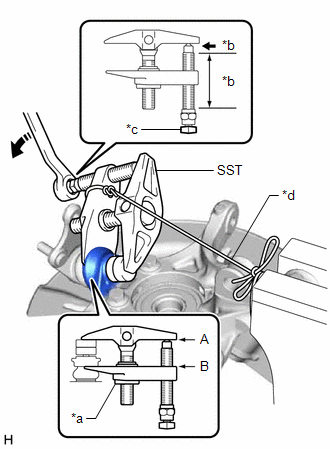
|
*a | Center Nut |
|
*b | Molybdenum Grease Application Area |
|
*c | Place wrench here |
|
*d | String |
 |
Turn |
CAUTION:
Apply molybdenum grease to the threads and end of the SST bolt.
NOTICE:
- Be sure to tighten the string firmly to secure SST to the front axle assembly to prevent SST from falling off.
- Install SST with the center nut so that (A) and (B) shown in the
illustration are parallel. Otherwise, the front lower ball joint dust
cover may be damaged.
- Be sure to place a wrench on the part shown in the illustration.
- Do not damage the front lower ball joint dust cover.
- Do not damage the steering knuckle.
- Do not damage the front disc brake dust cover.


